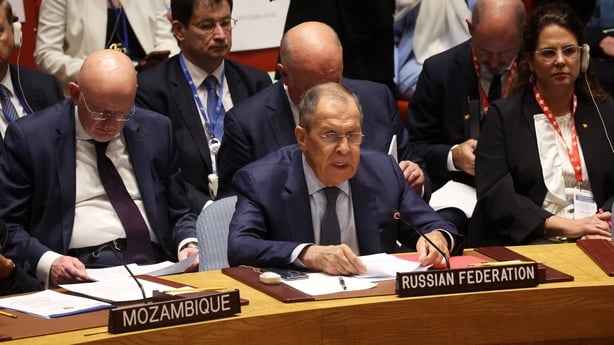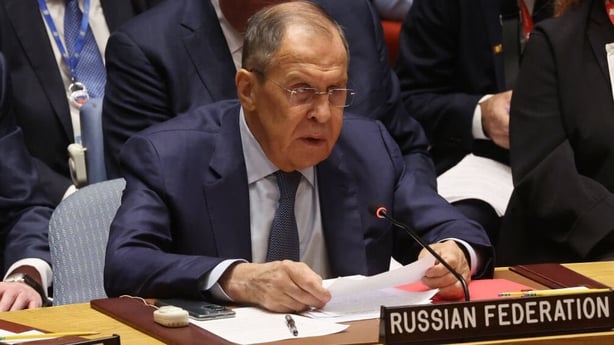Ukrainian President Volodymyr Zelensky has confronted Russia directly at the United Nations Security Council, denouncing the Kremlin's invasion of his country as "criminal" and urging the UN to strip Moscow of its veto power.
"Most of the world recognises the truth about this war," he said.
"It is a criminal and unprovoked aggression by Russia against our nation aimed at seizing Ukraine's territory and resources."
Mr Zelensky called on the United Nations to vote to end Russia's veto power on the Security Council.
He said the move could be among wide-ranging reforms at the Security Council that would include permanent representation for developing nations - where support for Ukraine has been lukewarm.
"Veto power in the hands of the aggressor is what has pushed the UN into a deadlock," Mr Zelensky said.
"It is impossible to stop the war because all efforts are vetoed by the aggressor or those who condone the aggressor."
Mr Zelensky repeated the Ukrainian stance that the veto power belonged to the former Soviet Union - one of the victors of World War II after which the United Nations was created - and not to President Vladimir Putin's Russia.
"Unfortunately, this seat in the Security Council, which Russia occupies illegally through backstage manipulations following the collapse of the Soviet Union, has been taken by liars whose job it is to whitewash the aggression and the genocide."
Taking away Russia's veto power would be exceedingly difficult, with Mr Zelensky acknowledging that Moscow will not "give up this stolen privilege voluntarily".
There is, however, precedent as the General Assembly in 1971 transferred China's veto-wielding seat from Taiwan, then considered the country's representative, to the communist government on the mainland.
Russia's Foreign Minister Sergei Lavrov, who turned up at the Security Council after Mr Zelensky left, scoffed at the idea of ending Russia's veto and described it as a way to check Western power.
"The use of the veto is an absolutely legitimate tool laid out in the (UN) Charter," Mr Lavrov said.

He denounced Mr Zelensky, who is seeking to win back all territory occupied by Russia, for not negotiating and sought intervention by US Secretary of State Antony Blinken.
Addressing Mr Blinken, Mr Lavrov said, "I don't think it would be very difficult to give a command for Zelensky to lift the decree" against negotiations.
Mr Blinken, who had met Mr Lavrov before the war to warn against an invasion, has largely avoided meeting him since the war and no talks were planned in New York.
Analysis by Yvonne Murray, RTÉ Global Security Reporter
Volodymyr Zelensky arrived at the UN in his trademark khaki uniform, looking like a man from a country at war, but his message was one of peace.
He told council members that Ukraine was willing to work with members states on a formula for peace - one that restores the sovereign territory of Ukraine and underpins the rights of all states, enshrined in the UN charter, not to be invaded.
But he also took the opportunity to launch an attack on the UN for failing to halt Russia's aggression.
He argued that the veto Russia holds as a permanent member of the Security Council hobbles its ability to act.
"The UN finds itself in a deadlock on the matters of aggression," Mr Zelensky told the UN’s most senior decision-making body.
"Humankind no longer pins its hopes on the UN when it comes to the defence of the sovereign borders of nations."
A last-minute procedural objection by Russia threatened to derail today’s meeting.
Russian envoy to the UN, Vassily Nebenzia, accused Albania, which currently holds the rotating presidency, of a breach of protocol.
Ukraine should not speak before members of the Council, Mr Nebenzia argued.
A testy exchange ensued.
Albanian Prime Minister Edi Rama said that a lecture from Russia on violating the rules was "quite an impressive shoot".
He offered the Russian envoy a choice.
"If you agree you will stop the war, then President Zelensky will not take the floor," Mr Rama said.
Russia was overruled, and the meeting continued.
But Russian Foreign Minister Sergey Lavrov, who was in the building at the time, chose not to enter the chamber to hear Mr Zelensky speak.
Instead, he took his seat just moments before it was Russia’s turn. By that stage, the Ukrainian leader had left.

Mr Lavrov repeated his frequently made accusations against the United States and NATO for starting the war in Ukraine, having "staged a coup" in Kyiv.
He said that President Zelensky ran a "Nazi regime", under which Russian speakers were persecuted.
While Ukraine took centre stage today, there is some concern being expressed quietly by other member states that conflict and crisis in their parts of the world are not being given the same attention.
President Zelensky has spent the past two days in meetings with prime ministers and presidents and has no doubt received that message loud and clear.
That explains his appeal to member states - that a defence of Ukraine is a defence of the whole UN system.
If Russia gets away with what it has done in Ukraine, he told yesterday’s gathering of world leaders at the General Assembly, other countries could be next.

